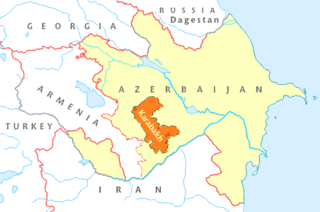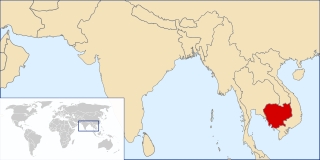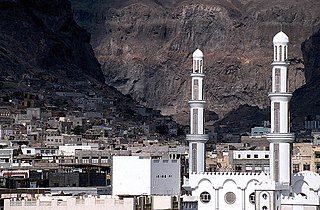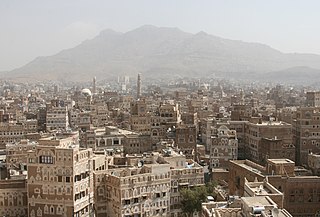
The member states of the United Nations comprise 193 sovereign states. The United Nations (UN) is the world's largest intergovernmental organization. All members have equal representation in the UN General Assembly.
A United Nations General Assembly resolution is a decision or declaration voted on by all member states of the United Nations in the General Assembly.

United Nations Security Council Resolution 678, adopted on 29 November 1990, after reaffirming resolutions 660, 661, 662, 664, 665, 666, 667, 669, 670, 674 and 677, the council noted that despite all the United Nations efforts, Iraq continued to defy the Security Council.

The Yemen Arab Republic, commonly known as North Yemen or Yemen (Sanaʽa), was a country that existed from 1962 to 1990 in the northwestern part of what is now Yemen. Its capital was at Sanaa. It united with the People's Democratic Republic of Yemen on 22 May 1990 to form the current Republic of Yemen.

United Nations Security Council Resolution 688, adopted on 5 April 1991, after receiving letters from the representatives of France, Iran, and Turkey and expressing its concern over political repression of the Iraqi people, including those in Iraqi Kurdistan, the Council condemned the repression and demanded that Iraq, as a contribution to removing the threat to international peace and security, end the repression and respect the human rights of its population.

As of 4 October 2023, there are 193 member states in the United Nations (UN), each of which is a member of the United Nations General Assembly.
United Nations Security Council Resolution 179 was adopted on June 11, 1963. The parties directly concerned with the situation in Yemen agreed to disengage and the Governments of Saudi Arabia and the United Arab Republic agreed to pay the expenses for a UN observers mission over 2 months. The Council urged the parties to observe the terms of disengagement and requested the Secretary-General establish the observation operation as he defined and to report to the Council on the implementation of the resolution.
United Nations Security Council Resolution 188, adopted on April 9, 1964, after a complaint by the Yemen Arab Republic about a British air attack on their territory on March 28, the Council deplored the action at Harib as well as at least 40 other attacks that had occurred in that area. The United Kingdom had also complained that Yemen had violated the airspace of the Federation of South Arabia.

United Nations Security Council Resolution 232, adopted on December 16, 1966, noted with concern that the efforts to break off international economic activity with Southern Rhodesia had failed to bring the rebellion to an end, the Council decided that all member states would prevent the importation of an asbestos, iron ore, chrome, pig-iron, sugar, tobacco, copper, or animal-products that had originated in Southern Rhodesia. Additionally, the activities of any of their nationals designed to promote the export of these commodities or the importation of arms, ammunition of all types, military aircraft, military vehicles and equipments and materials for the manufacture and maintenance of arms and ammunition along with a total embargo of oil and oil products, though exception was made for contracts granted before this resolution.

United Nations Security Council resolution 874, adopted unanimously on 14 October 1993, reaffirmed sovereignty and territorial integrity of the Azerbaijani Republic and of all other States in the region, called for the preservation of the ceasefire, cessation of hostilities and withdrawal of forces from recently occupied districts of the Republic of Azerbaijan, and reaffirmed resolutions 822 (1993) and 853 (1993). The Council expressed its concern at "...the conflict in and around the Nagorny Karabakh region of the Azerbaijani Republic, and of the tensions between the Republic of Armenia and the Azerbaijani Republic...", and called upon the parties to observe the ceasefire agreed with by the government of Russia and OSCE Minsk Group.

United Nations Security Council resolution 668, adopted unanimously on 20 September 1990, after noting the ongoing political discussions and efforts regarding a just and lasting peaceful situation in Cambodia, the council endorsed the political framework that would enable the Cambodian people to exercise their right to self-determination through U.N. organised elections.

United Nations Security Council resolution 924, adopted unanimously on 1 June 1994, after considering the civil war in Yemen between the Yemeni government and Yemeni Socialist Party, the Council called for the immediate cessation of hostilities and for a fact-finding mission to be sent to the country.

United Nations Security Council resolution 931, adopted unanimously on 29 June 1994, after recalling Resolution 924 (1994) on the civil war in Yemen, the Council considered the findings of the fact-finding mission deployed to the country and demanded a ceasefire.

United Nations General Assembly Resolution 62/243, titled "The Situation in the Occupied Territories of Azerbaijan", is a resolution of the United Nations General Assembly about the situation in Nagorno-Karabakh, which was adopted on March 14, 2008 at the 62nd session of the General Assembly. It became the seventh United Nations document concerning Nagorno-Karabakh and the third and last United Nations General Assembly document on it.
Organisation of the Islamic Conference Resolution 10/11, titled "The aggression of the Republic of Armenia against the Republic of Azerbaijan", is an Organisation of the Islamic Conference Resolution on Nagorno-Karabakh conflict adopted by its member states on March 13–14, 2008 during the OIC summit in Dakar, Senegal.

The Cabinet of Yemen refers to the governing body of the internationally recognized Yemen government led by the Chairman of the Presidential Leadership Council Rashad al-Alimi who replaced former President of Yemen Abdrabbuh Mansur Hadi on 7 April 2022 as the new President of Yemen. He then selected new cabinet members of the Yemeni Government.
United Nations Security Council Resolution 2014 was unanimously adopted on 21 October 2011.

United Nations Security Council Resolution 2051 was unanimously adopted on 12 June 2012.

The United Nations General Assembly resolution 498 was approved on February 1, 1951, in response to the intervention of Chinese Communist troops in Korean War.














